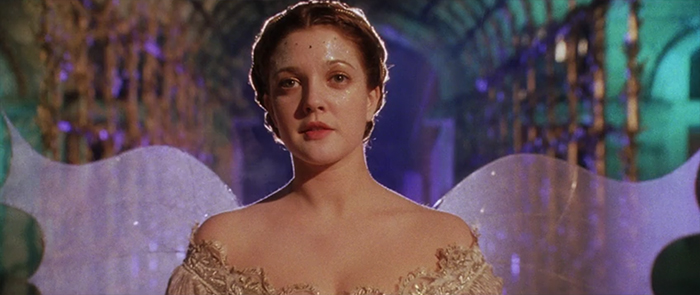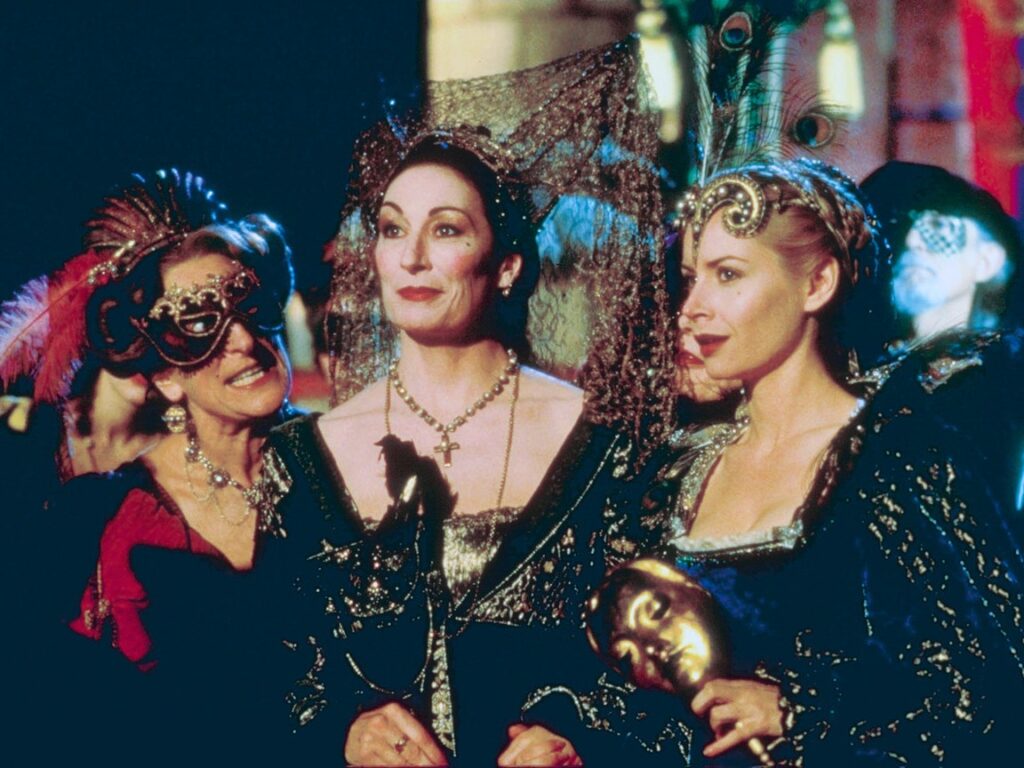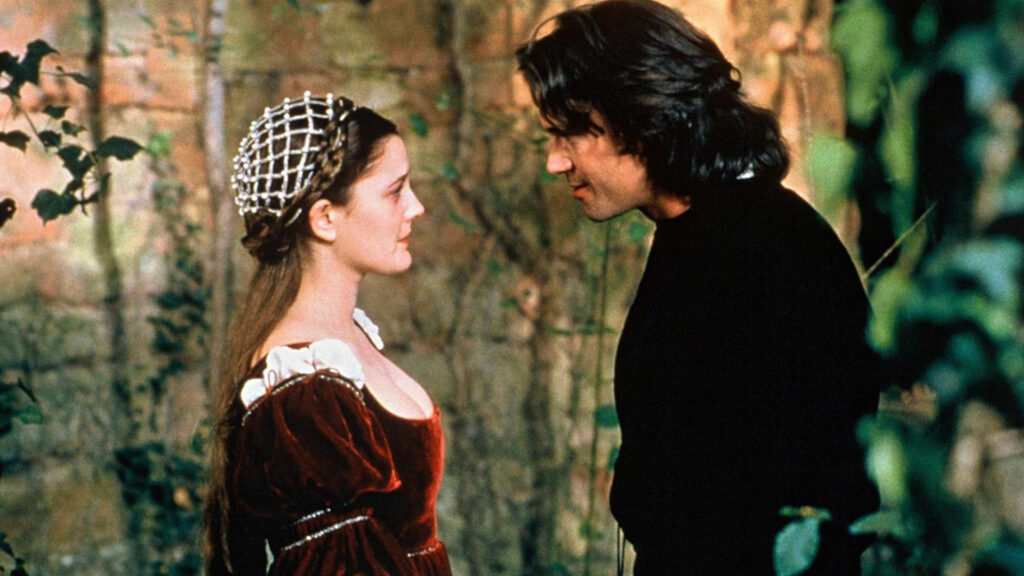Ever After (1998)

DIRECTOR: Andy Tennant
CAST: Drew Barrymore, Anjelica Huston, Dougray Scott, Megan Dodds, Melanie Lynskey, Patrick Godfrey, Lee Ingleby, Timothy West, Judy Parfitt, Richard O’Brien
REVIEW:
Remakes are a dime a dozen, but among the unnecessary and superfluous variations of the same old story, Ever After—a take on the oft-told Cinderella story—proves that occasionally one comes along that’s fresh and irreverent enough to still have spunk and energy, to stand on its own and justify its own existence. A costume romantic comedy, Ever After is a frothy delight that demonstrates that it is possible to put a fresh spin on a classic just when it seems the premise has run out of anywhere interesting to go.
Apart from a bookend prologue and epilogue with an elderly woman (Jeanne Moreau) setting the record straight by regaling the Grimm brothers (Joerg Stadler and Andy Henderson) with the “true” story of Cinderella, the movie takes place in 1502 Renaissance-era France, where Danielle de Barbarac (Drew Barrymore), the beloved daughter of a wealthy widower (Jeroen Krabbe), is orphaned when her doting father dies suddenly, leaving her in the clutches of—of course—her wicked stepmother Rodmilla de Ghent (a deliciously vampy Anjelica Huston, who seems to be enjoying herself immensely), who treats Danielle like a servant in favor of her own spoiled daughters Marguerite (Megan Dodds) and Jacqueline (Melanie Lynskey). Ten years later, Danielle has a chance encounter with the rebellious Prince Henry (Dougray Scott) when he rides through her family orchard one day. From there commences a story the broad strokes of which will be familiar—mistaken identities and misunderstandings, the scheming of a wicked stepmother, a costume ball, and a glass slipper—but Ever After refreshingly puts its own spin on the particulars.
When it comes to the (many) versions of the classic Cinderella story, most are either straight(ish) adaptations—the 1950 Disney animated film—-or modernized variations. Ever After is somewhere in the middle; it’s a costume drama set in Renaissance-era France, but the fairy godmother, the pumpkin carriage, and any fantasy supernatural elements have been excised, and while technically in a faithful period setting, the movie is not slavishly beholden to it (characters play rock, paper, scissors, for example, which might give sticklers for historical accuracy a conniption and makes clear we’re not meant to take things too seriously). Perhaps most refreshingly and invigoratingly, it gives the story a feminist updating without beating one over the head with it or taking itself too seriously. Danielle is no passive damsel; she’s a feisty tomboy who takes matters into her own hands, whether in her “meet cute” with Prince Henry that’s really more of a “meet ugly”—she knocks him off his horse with an apple while mistaking him for a thief—or disguising herself as a courtier (for reasons which have nothing to do with pursuing the Prince) to rescue a servant from shipment to the Americas and quoting Thomas More’s Utopia at the unenlightened elitist Prince while she’s at it. Unlike most cheerfully chauvinist fairy tales, where the Prince Charming awakens the passive damsel to a larger world, here it’s Danielle who opens Henry’s eyes. Initially, Henry is no perfect “Prince Charming”—he’s snooty and oblivious, albeit basically good at heart—but he’s intrigued by this spirited and intelligent girl who dares to tell him off, and sets out to track her down. Alas, needless to say, therein lie the plot complications (especially when Rodmilla has her sights set on matchmaking the Prince and her favorite daughter Marguerite and has no intention of letting Danielle stand in her way). There’s an amusing twist in a forest confrontation with gypsies in which Danielle comes to Henry’s rescue rather than the other way around, and later a nice subversion on cliches when Henry gallantly rides to the rescue, only to find Danielle has done her own rescuing. And while there’s no mice or fairy godmother, there is a fairy godfather of sorts in the form of none other than Leonardo Da Vinci (Patrick Godfrey), who gives Henry and Danielle a little prodding here and there and helps Danielle get ready for the big ball (without a magic wand or a pumpkin).

The movie takes place in a romanticized Renaissance-era France where everyone is clean and attractive and has good teeth, but Andrew Dunn’s cinematography makes for a handsome costume drama, complimented with the use of lush scenery, luxuriant costumes, and on-location filming in real castles and chateaus. And while the tone is primarily light and frothy, the script—by Susannah Grant, Andy Tennant, and Rick Parks—isn’t dumb. In addition to amping up the feminist girl power by making Danielle an active 90s-style proactive heroine who can take matters into her own hands and rescue herself, there’s a little social commentary—without ever being overbearing about it—in Danielle’s penchant for quoting Utopia, and the idea that Danielle and Henry, while existing at opposite extremes of the social ladder, are both in a way trapped by their positions (his parents the king and queen of France, played semi-fatuously by Timothy West and Judy Parfitt, are demanding he submit to a loveless arranged marriage if he wants to inherit the throne). Additionally, the script gives the “wicked stepmother” some human dimensions while still being, well, wicked enough for us to root for her comeuppance; there’s an intriguing scene between Danielle and Rodmilla where the older woman shows a fleeting glimmer of a more vulnerable side, and at one point sums up her own motives in no-nonsense fashion: “how can one ever love a pebble in their shoe?”.

Drew Barrymore makes for a sturdy lead, injecting Danielle—and by extension, the movie—with an abundance of spunk and feisty energy. She’s believable whether knocking a man off his horse with a well-aimed apple, or cleaning up nicely for the costume ball climax, and brings the right quotients of toughness, spirit, intelligence, and vulnerability. Anjelica Huston is a first-rate foil, sinking her teeth into the wicked stepmother with relish and an abundance of eye narrowing and eyebrow arching. Dougray Scott manages to make Henry likable rather than bland—a common fate for hunky love interests—perhaps aided a little by a script that gives him a little more dimension than a one-note Prince Charming, and exhibits a playful chemistry with Barrymore as they bounce off each other in enjoyable love/hate fashion. In supporting roles, we have some comic relief from Patrick Godfrey as a pseudo fairy godmother-esque Leonardo Da Vinci and Timothy West and Judy Parfitt’s improbably benign and fatuous king and queen, along with Megan Dodds as the spoiled, chip-off-the-old-block Marguerite and Melanie Lynskey as the frumpy Jacqueline who harbors a secret sympathy for Danielle, Lee Ingleby as Danielle’s friend/sidekick Gustave, and Richard O’Brien (The Rocky Horror Picture Show‘s Riff Raff) as the fatuously-named Pierre Le Peu, an odious nobleman with a lecherous eye for Danielle and an eminently twirl-worthy mustache. Opening bit parts include Dutch actor Jeroen Krabbe (the villain in The Fugitive) as Danielle’s beloved father, and legendary French actress Jeanne Moreau in a cameo.
Ever After is refreshing proof that sometimes a new spin on an oft-told tale can still be surprisingly fresh, boosted by a colorful period costume drama setting, a sharp script, and lively performances. Far from feeling tired or played-out, it’s frolicking and fun, funny and romantic, and an eminently enjoyable slice of summer entertainment.
* * *